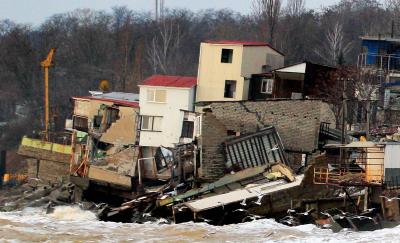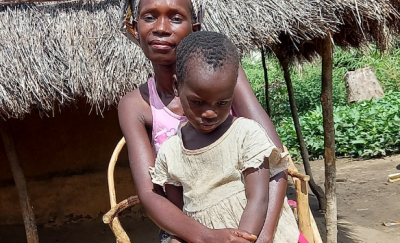The health sector is on the frontlines of the climate crisis, with extreme heat, floods, fires, and storms contributing to increased illnesses, changes in disease patterns, and health service delivery disruptions, to name a few. Nothing threatens human health more than climate change.
Working across sectors and geographies, Abt leads flagship programs to accelerate the response to HIV/AIDS, eradicate malaria, strengthen subnational health systems, improve reproductive health while also catalyzing the clean energy transition, electrify rural health facilities, build methane mitigation capacity, and strengthen community climate adaptation and resilience planning. By working on both sides of the climate and health equation, we understand the intersection well and the need to develop integrated responses.
To address this massive challenge, we partner with clients, ministries of health, local organizations, and communities to better understand climate hazards and vulnerabilities. We co-develop approaches to mainstream adaptation and mitigation strategies that improve the resilience of systems, communities, and people worldwide. Our work draws equally on Abt’s data-driven technical expertise and on the insights of communities we partner with, ensuring that—together—we devise equitable, sustainable, locally tailored solutions to the most pressing climate and health challenges.
Expertise
Abt designs health interventions that build climate-resilient and sustainable health systems. We offer a comprehensive suite of solutions from systematic identification of climate risks to the quantification of health co-benefits of climate action.
Our climate-informed strategies advance all levels of health programming – from health system strengthening to specific priority objectives, such as meeting the 95-95-95 HIV/AIDS targets and reducing malaria mortality and morbidity.
Climate and Health Services:
- Climate information services for health decision-making
- Early warning for health
- Health co-benefit analyses
- Health sector risk and vulnerability assessment
- Resilience and adaptation policy development and planning
- Responsible medical waste management
- Health workforce climate training
- Facility-level climate risk assessment
- Health-sector greenhouse gas emissions accounting
- Green health supply chain management
- Climate finance for health
- Vector-borne disease surveillance and predictive modelling
- Health facility electrification and service continuity planning
- Climate-induced migration health service delivery planning
Relevant Experience
Improving Emergency Planning and Preparedness in Subnational Health Systems
Client: USAID Local Health System Sustainability Project (LHSS)
The LHSS project supports countries to develop and reinforce health systems that are strong, resilient, and sustainable. We do this by partnering with local actors to co-develop solutions that meet contextual challenges through collaboration and tailored assistance. Colombia, Jamaica, Tajikistan, and Kazakhstan are working to strengthen diagnostic networks and laboratory systems; advance the One Health workforce; operationalize environmentally friendly hospital waste management; improve emergency preparedness and epidemic response planning; and coordinate with numerous partners to advance shared visions of global, national, and sub-national health security.
Powering Health with Clean Energy in Sub-Saharan Africa
Health Electrification and Telecommunications Alliance (HETA)
Client: USAID/Power Africa
In sub-Saharan Africa, only about one-third of health facilities have reliable access to electricity, hindering critical and foundational medical care for millions of people. Abt is leading a USAID Global Development Alliance to provide reliable, renewable power and digital connectivity to health facilities across the region. Abt and core partners RESOLVE, bechtel.org (Bechtel’s social enterprise), and Orange will leverage USAID’s $47 million investment to identify innovative, sustainable public-private partnerships and financing models so health facilities can keep the lights on to respond to medical emergencies, provide nighttime services, power equipment that keeps vaccines viable and effective, and share data in real time. These and other benefits will improve access to life-saving care and increase the resilience of countries’ health systems. HETA’s model emphasizes energy as a service, which includes support for long-term operations and maintenance of the systems—addressing a key challenge for sustainability.
Managing Medical Waste and Supporting Climate Adaptation Planning
Healthy Mother Healthy Baby (HMHB) Activity; Building Capacity for Climate Resilience Project
Client: USAID; ADB
In Tajikistan, Abt assessed the medical waste management systems of 23 district health centers and found the majority did not have safe systems in place, potentially endangering the health and well-being of nearby communities and the environment. These centers lacked appropriately trained staff, environmentally friendly incinerators, and protocols and standard operating procedures to guide the management and disposal of medical waste. COVID-19 vaccines and preventative measures—including personal preventative equipment (PPE)—have increased medical waste, posing further environmental and pathogenic risks. Abt is working with government counterparts and facilities to procure environmentally friendly incinerators and improve centers’ medical waste management systems, with an eye on sustainability, greenhouse gas mitigation, and the scaling up of additional facilities and provinces. Abt has also contributed to Tajikistan’s national climate adaption strategy through the ADB-funded Building Capacity for Climate Resilience project. We collaborated with local communities to develop adaptation plans and spread climate change awareness among diverse stakeholders involved in local development planning.
Quantifying Health Co-benefits
Building Low Emission Alternatives to Develop Economic Resilience and Sustainability (B-LEADERS); Climate Economic Analysis for Development, Investment and Resilience (CEADIR) projects; and New York Climate Leadership and Community Protection Act (CLCPA) assessment
Client: USAID; New York State Energy Research and Development Authority
Economic and financial analysis enable stakeholders to make informed, evidence-based decisions on cost-effective climate interventions and highlight dual benefits to public health. Abt’s cost-benefit and co-benefits analyses evaluate the health co-benefits of climate mitigation and adaptation strategies at various scales, enabling stakeholders to align priorities. In the Philippines, Abt conducted a cost-benefit analysis (CBA) of multi-sectoral climate mitigation options and an accompanying health co-benefit analysis, which informed the Philippines’ first Nationally Determined Contribution submission. In Malawi and Zambia, Abt conducted CBAs that compared charcoal and wood use for household cooking with demand/supply side alternatives for forest conservation. The analyses documented the cost-effectiveness of fuel-switching and the clear health co-benefits associated with reduced exposure to fine particulate matter (PM2.5). In the U.S., Abt quantified the potential health co-benefits generated by New York City’s climate action plan, including estimating how changes in energy consumption result in reduced emissions of air pollutants, then modeling how the subsequent changes in emissions would impact air quality, and the resulting health effects. Finally, we estimated the monetary value of these health benefits. These monetized health benefits helped New York demonstrate that the benefits of the state’s climate action law would exceed the costs of implementing.
Climate Change Impacts on the U.S. Healthcare System
Citation: Shoemaker-Hunt SJ, Ward M, et al. A Framework for Understanding the Impacts of Climate Change on the US Healthcare System and Environmental Justice Implications. AcademyHealth Annual Research Meeting. Washington DC, June 4-7, 2022.
Abt created a solutions-focused framework for the U.S. healthcare system that identifies key climate stressors, including more frequent extreme weather events, wildfires, droughts, and heat islands, associated health impacts, and opportunities to mitigate them. In addition to exacerbating morbidity and mortality rates, hospital visits, and psychosocial impacts, the framework found climate stressors disproportionately affect communities facing inequitable social and environmental conditions. For example, impacts on water and air quality, transportation, housing, and agricultural systems have the potential to worsen conditions for marginalized and rural communities (e.g., water/food insecurity, work and childcare disruptions). The framework draws an explicit connection between advancing equity and addressing health care system responses to climate stressors through the social determinants of health.
Coordinating Disaster Response in Public Health Systems
Climate Economic Analysis for Development, Investment, and Resilience
Client: USAID
More than three quarters of India's population lives in districts that are highly vulnerable to extreme flooding, storms, and heat. Abt partnered with the UN Development Program and three Eastern municipalities in India (with a combined population of nearly 5 million people) to design 10 public-private partnerships (PPPs) to reduce risks from cyclones, monsoon flooding, and extreme heat and precipitation. The PPPs draw on private sector technical expertise and financing to improve coordination of disaster response in public health systems, strengthen community resilience, mitigate impacts of urban heat islands, and improve solid waste management to improve storm water drainage during heavy rains and flooding. Benefits from the PPPs included improved sanitary conditions, protection of green spaces, and a reduction in heat-related mortality.
Recalibrating Malaria Control Amid Climate Impacts on Disease Distribution
PMI VectorLink
Client: U.S. President’s Malaria Initiative
Climate change is rapidly shifting rainfall patterns as well as the seasonality and density of malaria-carrying mosquitoes, complicating efforts to combat the world’s deadliest disease. Flooding and high heat also take a toll on malaria vector control interventions. In 22 African countries plus Cambodia and Colombia, Abt conducts and strengthens local capacity in robust entomological surveillance, equipping countries to plan and implement indoor residual spraying (IRS) and the distribution of insecticide-treated nets. Teams receive electronic notifications to ensure timeliness and efficiency of spray campaigns. By adding accurate meteorological data to our analysis, we can also guide recalibration of approaches, shifting the timing of IRS campaigns in response to changing rain patterns and malaria transmission seasons. Climate-smart health services that capitalize on the use of climate-informed surveillance and early warning systems boost interventions’ effectiveness and reduce disease caseloads.
Developing Climate Change Indicators
Climate Impacts and Risk Assessment (CIRA)
Client: U.S. Environmental Protection Agency
Physical manifestations of climate change abound, including changes in the amount and variability of rainfall, increased frequency and magnitude of extreme weather events, and longer lasting heat extremes. Abt has developed and implemented spatially specific modeling approaches to assess the impact of climate change on key indicators, including disease-carrying vectors for Lyme disease and the West Nile virus, as well as wildfires, and human mortality associated with extreme heat and cold. Our geospatial and economic analyses help quantify and monetize how risks, impacts and damages associated with these and other indicators are affected by climate mitigation and adaptation strategies.
Managing Climate Risks to HIV Monitoring and Suppression
Efficiencies for Clinical HIV Outcomes
Client: USAID
In Mozambique, cyclones regularly destroy homes and possessions—and threaten the health of the country’s most vulnerable people. Between evacuations and the destruction of their homes, many HIV-positive people lose their medicines and health cards, limiting access to treatment and weakening their immune systems. In addition, any increase in malaria incidence following major floods also negatively impacts retention and adherence to antiretroviral treatments (ARVs). Abt proactively identified these climate risks to HIV suppression and planned responses to guide project activities. Abt-trained community workers ensure those dealing with the fallout from natural disasters continue HIV treatment. They work with national resettlement centers to deliver medications and replacement health cards and lead talks on HIV testing and ARVs. Climate risk management contributed to Abt’s success in nearly doubling the number of people on HIV treatment between 2019 and 2022.





















